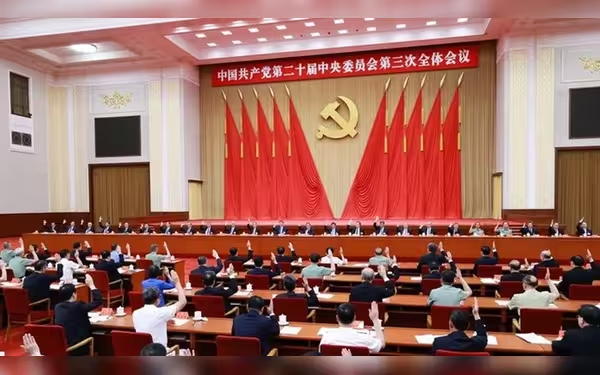Saturday, November 16, 2024 07:52 PM
China's Commitment to Peaceful Coexistence and Reform Policies
- China emphasizes dialogue and cooperation in global challenges.
- Reform policies focus on human welfare and ecological harmony.
- Five Principles advocate for mutual respect among nations.
 Image Credits: thefrontierpost
Image Credits: thefrontierpostChina's recent meetings highlight its commitment to reform, peaceful coexistence, and addressing global challenges through dialogue and cooperation.
In recent months, two pivotal meetings in Beijing have captured global attention, shedding light on China’s approach to modernization and international relations. The third plenary session of the 20th Central Committee of the Communist Party of China focused on advancing reform policies that aim to deepen the nation’s commitment to Socialism with Chinese Characteristics. This concept adapts Marxist theory to fit the unique realities of China, emphasizing the need for a tailored approach to governance and development.
Simultaneously, the Conference Marking the 70th Anniversary of the Five Principles of Peaceful Coexistence highlighted a framework for resolving international conflicts through negotiation. This framework aligns with the founding principles of the United Nations, advocating for peaceful coexistence among nations. The interconnection between these two meetings is significant, as they both emphasize the importance of dialogue and cooperation in addressing global challenges.
From a Marxist perspective, it is clear that nations cannot achieve social, economic, and cultural development if a substantial portion of their resources is allocated to militarism. Instead, these resources should be directed towards development aid projects aimed at eradicating poverty and fostering a future of peace and progress. The conclusions drawn from the meetings in Beijing underscore the necessity of adapting Marxist principles to the realities faced by various countries, promoting a model of development that prioritizes human welfare and ecological harmony.
China’s commitment to reform policies is not merely about economic growth; it is also about enhancing the quality of life for its citizens. However, achieving these goals requires a shift in international relations, moving away from a Cold War mentality that fosters division and military competition. Instead, China advocates for a framework that emphasizes sincere dialogue and cooperation, offering basic principles for peaceful coexistence to the international community.
In an era marked by significant global challenges, it is crucial to recognize that economic development must go hand in hand with the advancement of socialist ethics. This means placing people at the center of political life and striving for harmony with the environment. Any modernization project must prioritize the balance between human needs and ecological sustainability, which includes reducing carbon emissions and combating climate change.
The relationship between the Third Plenary Session and the anniversary of the Five Principles of Peaceful Coexistence is vital. It reflects China’s determination to foster a community with a shared future for all humanity. This is particularly relevant as NATO’s recent summit has perpetuated a Cold War mentality, where security is often sought at the expense of others. In contrast, the Five Principles advocate for mutual respect and non-interference in the internal affairs of other nations, aligning with the core values of the UN Charter.
These principles address essential issues such as security, economics, and diplomacy, promoting a fair understanding of international law. They call for equitable relations between the North and South, enhancing South-South cooperation to alleviate poverty and underdevelopment. In a world rich in diverse cultures and civilizations, the Five Principles assert that no system should impose itself on others by force, and that all civilizations have valuable lessons to share.
Ultimately, overcoming the politics of division is crucial for resolving the tensions that affect many nations. China’s shared security model seeks to bridge the gap between the rich North and the poor South, promoting equitable relations and cooperation. This approach is not just about economic growth; it is about ensuring that all peoples can coexist peacefully and thrive together. As we navigate the complexities of international relations, the lessons from these meetings in Beijing remind us of the importance of dialogue, cooperation, and a commitment to shared human values.













